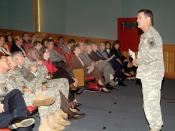The success of an organization depends on people working together and sharing a common purpose. The leaders of today need to focus on the workforce, in order to identify their individual human needs. Leaders are affected by the constantly changing environment in which globalisation plays a key role in increasing the diversity of the work force. Therefore, a successful leader is an individual who displays transactional, charismatic and transformational leadership.
A transactional leader is an individual who clarifies subordinates role and task requirements, initiates structure, provides rewards, and displays consideration for subordinates. To achieve these changes within the business the leader must be able to adjust the style of leadership to suit the subordinates' needs. When subordinates demonstrate a low readiness level to achieve tasks leaders need to adopt a directive style of leading that gives employees explicit directions on how tasks should be accomplished; however when the readiness level increases leaders should be able to adjust to a more delegating style of leadership that gives subordinates the responsibility for making and implementing decisions.
A successful leader also participates with subordinates to learn their needs so that it can be matched with a reward that would later increase the work outcome. This ability to satisfy and adapt to subordinates social needs may improve the productivity of the business.
Charismatic leadership goes beyond transactional leadership techniques. A charismatic leader has the ability to inspire and motivate people to do more than the call of duty. A leader bearing this quality has the ability to get people to embrace a common purpose and to implement a visionary idea that will excite, stimulate, and drive other people to work hard. This involves the leader being able to listen, in order to learn what moves people. But this listening is not necessarily done...


